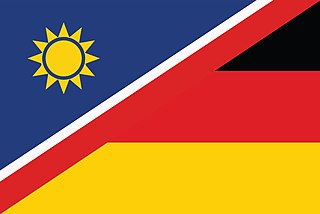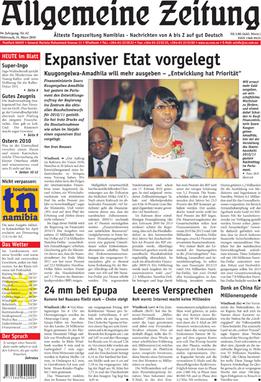The music of Namibia includes a number of folk styles, as well as pop, rock, reggae, jazz, house and hip hop.
Mduduzi ThembinkosiEdmund Tshabalala, also known as Mandoza, was a South African singer-songwriter and kwaito recording artist. He was known for his contributions to the kwaito genre and his numerous hit singles, including "Nkalakatha", "Uzoyithola Kanjani, Tornado", "Sgelekeqe", "Ngalabesi", "Godoba", "Tsotsi Yase Zola" and "Indoda", which topped the charts in South Africa and all over the African continent. His second album Nkalakatha, released in 2000, became the biggest selling album of his career, selling 350,000 units.

German Namibians are a community of people descended from ethnic German colonists who settled in present-day Namibia. In 1883, the German trader Adolf Lüderitz bought what would become the southern coast of Namibia from Josef Frederiks II, a chief of the local Oorlam people, and founded the city of Lüderitz. The German government, eager to gain overseas possessions, annexed the territory soon after, proclaiming it German South West Africa. Small numbers of Germans subsequently immigrated there, many coming as soldiers, traders, diamond miners, or colonial officials. In 1915, during the course of World War I, Germany lost its colonial possessions, including South West Africa ; after the war, the former German colony was administered as a South African mandate. Roughly half of the German settlers were allowed to remain and, until independence in 1990, German remained an official language of the territory alongside Afrikaans and English.

Martin Morocky, known by his stage name as The Dogg, is a Namibian musician. Considered a Kwaito artist, his debut album, Shimaliw' Osatana, was released in 2004 to mixed reviews. The Dogg was part of the group Omalaeti O'Swapo, which released one album in 2004. His music is enjoyed internationally, in countries such as South Africa, Botswana, Angola, Zambia, and Zimbabwe. The Dogg has performed in France, England, and Canada. He has received awards and nominations from Channel O. He is one of the highest-awarded artists in his country, as well as one of the highest-selling. As of 2022, King Tee Dee has about 11 albums, where most of his songs are on livestream, and over 20 awards to his name, and he is the most-awarded musician in Namibia.

Lazarus Shiimi, known by his stage name Gazza, is a Namibian musician.

Introducing TeeDee is the third studio album by Namibian kwaito musician and producer The Dogg. It was released by Mshasho Productions in May 2006, and was the first to be managed by KOOL Productions. The album introduced his alias TeeDee to his fans. This album is a replacing recording for his bootlegged album Mshasho Mos! which was supposed to be released in December 2005. Introducing TeeDee include revised songs which were intended to be released on the bootleg album. The album's first single "Baby Don't Go" released in 2005 was very successful in the Southern African region and its video won the award for best newcomer at the 2007 Channel-O Spirit of Africa Music Video Awards.

Gal Level is a R&B female duo from Windhoek, Namibia, made up of Daphne Willibard and Frieda Haindaka. They are very popular in Southern Africa, and other African countries. They are produced and managed by continental music producers Ogopa Deejays of Kenya. They have been compared to US girl group Destiny's Child.
Channel O Africa Music Video Awards, once known as Spirit of Africa Music Video Awards, are Pan-African music awards organised by South Africa -based Channel O television channel. The awards were first held in 2003 under the name Reel Music Video Awards. Since 2005 the awards have been held annually. The winners are voted by Channel O's viewers across the continent.

The Allgemeine Zeitung founded in 1916, is the oldest daily newspaper in Namibia and the only German-language daily in Africa to survive World War I.
Nora Schimming-Chase was a Namibian politician and Namibia's first ambassador to Germany from 1992 to 1996. After changing her party membership from South West Africa National Union (SWANU) to Congress of Democrats (CoD), Schimming-Chase became a member of the National Assembly of Namibia from 2000 to 2010.

German South West Africa was a colony of the German Empire from 1884 until 1915, though Germany did not officially recognise its loss of this territory until the 1919 Treaty of Versailles.

German South West Africa was a German colony in Africa, established in 1884 with the protection of the area around Lüderitz and abandoned during World War I, when the area was taken over by the British.

Namibia, formerly known as South West Africa and German South West Africa, has a long history of postal services, starting in 1814 with postal runners delivering messages among mission stations. The first stamps were printed during the German colonial period. Currently NamPost is responsible for running postal services, managing 135 postal offices in the country.
GDR children of Namibia is a colloquial term denoting black Namibian children that were raised in East Germany, also known as the German Democratic Republic (GDR). During the South African Border War, the children of hundreds of Namibian refugees and political exiles were resettled and educated in the GDR from 1979 onwards. They were repatriated upon German reunification and their native country's formal independence from South Africa in 1990.
Harold Pupkewitz was a Lithuanian born, Namibian entrepreneur and member of the President's Economic Advisory Council. He was the Executive Chairman of Pupkewitz Holdings, a group of builders' merchants, car sale businesses, and a host of other enterprises, from its foundation in 1946 until his death. Pupkewitz directed the boards of several important Namibian companies, among them NamPost, NamPower, Telecom Namibia, and MTC Namibia, and served as president of a number of high-profile political and economical institutions.
The Namibian Annual Music Awards (NAMA) ceremony was the biggest awards ceremony in Namibia. It was established in 2011 by MTC Namibia and the Namibian Broadcasting Corporation (NBC). They would award a NAMA trophy to musicians in recognition of their outstanding achievements in the music industry of Namibia. Along with the trophy, musicians receive sponsorships, endorsement deals and cash prizes.
Lady May is a Namibian singer. She came to fame in 2004 with the release of her first album Kamali which won her her first award at the Sanlam-NBC Music Awards. Namundjebo is one of the most popular female singers in Namibia. Her music is also recognized beyond the Namibian border and she has been nominated and won several awards at the Channel O Music Video Awards.

Namibia is a multilingual country in which German is recognised as a national language. While English has been the sole official language of the country since 1990, in many areas of the country, German enjoys official status at a community level. A national variety of German is also known as Namdeutsch.
PDK is an all-male trio band from Namibia. They started off as dancers and were known as The Action Boys. Later they changed their name to Action Geez. Now they perform under the name of PDK which represents the initial of their first name. The group has performed in the Namibian Annual Music Awards. They have also performed in several other reputed award shows and events. Patrick is the lead singer of the group while Dion has a unique style. Kamtonyo is a median combination of the two. The group is known to take inspiration for its music from reality.
David Shikalepo, popularly known by his stage name as Exit, is a Namibian musician. He is considered as a kwaito artist. Moreover, he was awarded the best kwaito and male artist of the year at Namibians Annual Music Awards (NAMAs) awards in the year 2018.










